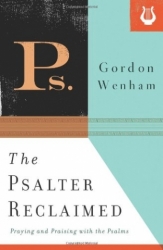A Brief Book Summary from Books At a Glance
About the Author
Gordon Wenham (PhD, University of London) studied theology at the universities of Cambridge, London, and Harvard, taught Old Testament at Belfast and Gloucestershire Universities, and is now adjunct professor at Trinity College, Bristol. He has also authored a number of critically acclaimed Bible commentaries and books.
Publisher’s description
One of the most respected Old Testament scholars of our time introduces us to the history of scholarship on the Psalter and provides hermeneutical guidelines for interpreting the book—making accessible to us the transforming message of the Psalms.
Table of Contents
1 What Are We Doing Singing the Psalms?
2 Praying the Psalms
3 Reading the Psalms Canonically
4 Reading the Psalms Messianically
5 The Ethics of the Psalms
6 The Imprecatory Psalms
7 Psalm 103: The Song of Steadfast Love
8 The Nations in the Psalms
Chapter 1
What Are We Doing Singing the Psalms?
Chapter in a Sentence
The author briefly surveys the history of the Psalter’s use in church practice through the ages, culminating in a contemporary argument for viewing the Psalms from the perspective of speech act theory.
Chapter Summary
The ethical significance of the Psalms has been almost entirely overlooked by contemporary scholarship. This oversight is even more striking when one considers that the Psalms have held such a central place in Jewish and Christian liturgical history, as well as that they appear to be an anthology compiled for the secondary purpose of personal devotion and spiritual formation.
The books of Chronicles give numerous examples of the role of the Psalms in Levitical liturgies. The Psalms themselves showcase their place in temple worship, with numerous mentions of approaching the altar, making sacrifice, and participating in national festivals, such as Passover or Tabernacles. Among the Dead Sea Scrolls, the Psalms are the most prevalent documents, demonstrating their consistent use in Jewish worship through the time of the New Testament.
The use of the Psalms in private prayer and public worship is advocated throughout church history, with examples in Athanasius (4th century), St. Benedict (6th century), and Martin Luther (16th century). Singing, as distinct from mere recitation, helps promote concentration because it involves both body and mind in worship. The rhythm of singing also aids in memorization. Given the prohibitive costs of books throughout most of history, the singing and memorization of the Psalms was a great service to the congregation.
The Psalter is a microcosm of the canon, surveying biblical history, themes, and ethics from creation through the Davidic kingdom and into the temple period. In many ways, the Psalter is a “New Pentateuch” which is arranged into five books, like the Torah, and which was more readily meditated upon day and night for those outside of priestly and scribal roles. It fits the pattern of ancient anthologies which were intended for memorization, such as the Aeneid.
Even beyond the didactic functions already discussed, the Psalter also contains a dimension of ethical commitment. Reciting, singing, praying the words of a psalm entails the relational commitments discussed therein. Theology and ethics are taught and embodied in the corporate liturgy of Psalmody. The faith proclaimed explicitly by the congregation implicitly bolsters the faith of each individual congregant.
The ethics of the Psalms commits the reciter in attitudes, speech, and actions. Engaging in such speech-acts does not merely exchange information, it changes situations. For example, a promise creates an obligation on the speaker and an expectation in the hearer. Viewing the Psalms as speech-acts distinguishes their reading from both narrative and law, since the point of a story or the nature of a law may be ignored, while the recitation of the Psalm effects an outcome of worship and affects both speakers and hearers.
The Psalms contain commissive, expressive, and declarative speech acts, giving promises, evoking emotions, and effecting changes, respectively. Often, more than one of these things may be present within the same utterance.
Statements which might ordinarily be mere indicatives take on a performative aspect in the context of psalmic worship. Even statements as simple as “God is my king,” beyond the obvious declaration, can evoke the emotions and the promises/obligations entailed by the relationship between subject and sovereign. Saying these things to God and each other involves more than merely rehearsing them or listening to their recitation. The Psalms provide explicit, embodied spiritual formation.
Chapter 2
Praying the Psalms
Chapter in a Sentence
This chapter is an extended argument in favor of praying through all of the psalter regularly, including praise, lament, penitential and messianic psalms.
Chapter Summary
The significance of the subjects of the initial chapter notwithstanding, the main purpose of the Psalms is as an inspired prayer book. The practice of praying through the Psalter congregationally and individually has fallen on hard times, but there are several good reasons to retrieve this classic practice….
The remainder of this article is premium content. Become a member to continue reading.
Already have an account? Sign In
